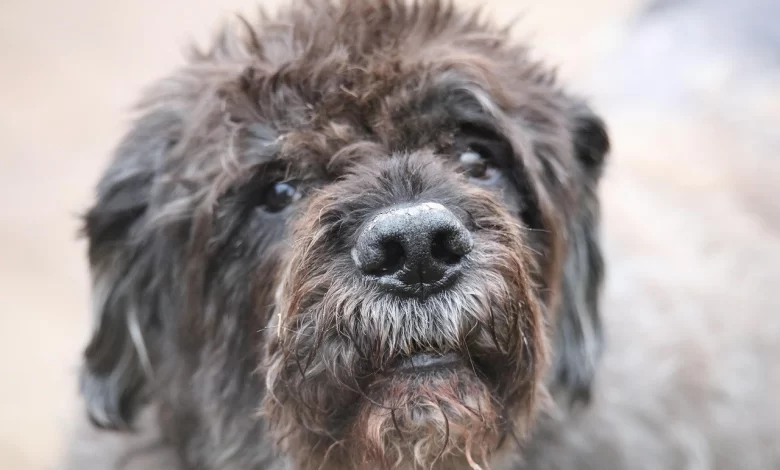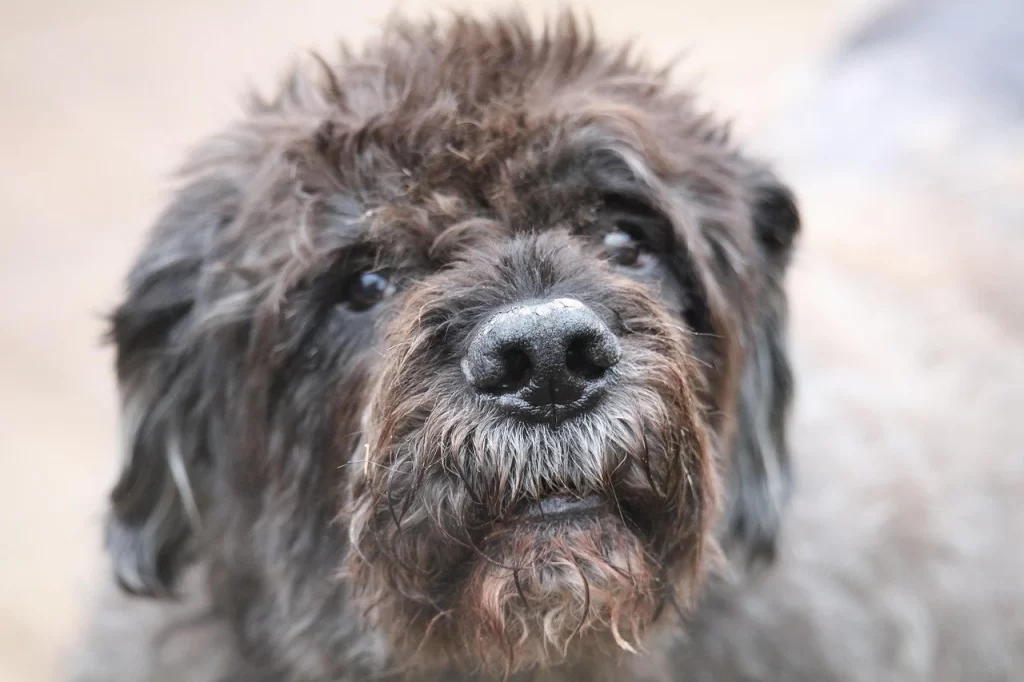
Is the Bouvier des Flandres the Right Dog for Your Home? The Bouvier des Flandres is a loyal, intelligent, and protective breed, originally bred for farm work and herding in Belgium. With proper training and socialization, it excels as a devoted family companion and guardian.
In this article, we’ll explore the Bouvier des Flandres and its temperament, training needs, exercise requirements, and essential care tips to ensure a happy and well-balanced Bouvier des Flandres.
What is a Bouvier des Flandres?
The Bouvier des Flandres is a strong, intelligent, and hardworking breed that originated in Belgium’s Flanders region. These dogs were originally bred for tough farm jobs like herding cattle, pulling carts, and guarding property. Today, they are known for their versatility, loyalty, and courage.
One of their most distinctive features is their thick, double-layered coat and their signature “moustache,” which gives them a dignified and rugged look. Bouviers are not only strong and capable but also incredibly devoted to their families, making them excellent companions for the right home.
Size, Weight & Lifespan
Bouviers are solidly built dogs with a powerful frame. Males can grow up to 68 cm (about 27 inches) tall and weigh between 35 and 40 kg (77-88 lbs). Females are slightly smaller, standing around 62 cm (24 inches) tall and weighing between 27 and 35 kg (60-77 lbs).
- With proper care, a healthy Bouvier des Flandres can live between 10 and 12 years. Providing them with a nutritious diet, regular exercise, and routine vet check-ups can help them live a long, happy life.
What’s Their Personality Like?
The Bouvier des Flandres is known for being calm, confident, and deeply loyal. They form strong bonds with their families and are natural protectors, always keeping a watchful eye on their loved ones. While they can be a bit reserved around strangers, they are affectionate and loving with those they trust.
Thanks to their herding instincts, Bouviers may try to “herd” small children or other pets, but this behavior is more playful than aggressive. Early socialization and consistent training help them become well-rounded, polite companions. They respond best to positive reinforcement and thrive in households where they receive both mental and physical stimulation.
Real Bouvier Stories
Llems the Bouvier
- “Llems is super chill—so much so that she’s practically horizontal all day! She isn’t an early riser and has an impressive ability to hold her bladder. While she enjoys our morning walks, she’s more than happy to wait a little longer. When we’re home, she loves lounging on the patio, occasionally chasing a squirrel.” – Helen, Portsmouth
Hugo the Bouvier
- “Hugo is a rockstar. He’s incredibly skilled at all the important Bouvier jobs—barking, running, eating, and, of course, napping. He’s one of the best dogs I’ve ever had.” – Yazz, London
How Much Exercise Do They Need?
Bouviers are active and energetic dogs that require at least 1.5 to 2 hours of exercise per day. This can include long walks, jogging, agility training, or interactive games like fetch. Without enough activity, they may become bored and develop destructive behaviors.
- For puppies, exercise should be moderate—short play sessions of about 15–20 minutes a few times a day work best. As they grow, you can gradually increase their activity level. By 12 to 18 months, they’ll be ready for full exercise routines.
Bouviers also enjoy jobs or activities that challenge their minds, such as obedience training, herding trials, or canine sports. They are happiest when they have a purpose, so incorporating structured training sessions into their daily routine can help keep them engaged and well-behaved.
Grooming Needs
Yes, Bouviers require regular grooming! Their thick, double-layered coat is low-shedding but prone to tangling, so regular maintenance is essential.
Grooming Routine:
- Brushing: Brush their coat 2-3 times a week with a pin brush or slicker brush to prevent mats and remove loose hair.
- Trimming: Regularly trim the hair around their ears, paws, and sanitary areas to maintain hygiene. A professional groomer every 6-8 weeks is a great idea.
- Bathing: Bouviers only need a bath every few months or when they get dirty. Overbathing can strip their coat of natural oils.
- Dental Care & Nail Trimming: Brush their teeth several times a week and trim their nails monthly to prevent discomfort.
With consistent grooming, Bouviers stay looking sharp and feeling great!
What Should They Eat?

A well-balanced diet is key to keeping your Bouvier healthy. Their food should be suited to their age, size, and activity level.
- Puppy Diet: High-quality, large-breed puppy food supports their rapid growth. They should have 3–4 small meals daily until around 6 months old, then transition to two meals per day.
- Adult Diet: Between 12 and 18 months, they should switch to an adult large-breed formula. Portion control is crucial, as Bouviers are prone to weight gain. Treats should be given in moderation, making up no more than 10% of their daily calorie intake.
Bouviers benefit from a diet rich in protein, healthy fats, and essential nutrients like glucosamine and omega-3 fatty acids to support their joints. Fresh vegetables, lean meats, and high-quality kibble or raw diets can all be part of a balanced meal plan.
Always consult your vet for specific dietary recommendations to ensure your Bouvier gets the right nutrients.
Common Health Concerns
While generally healthy, Bouviers can be prone to a few common conditions:
Joint Issues:
- Hip & Elbow Dysplasia: These conditions can cause joint pain and arthritis, so maintaining a healthy weight and providing joint-supportive nutrition is essential.
Eye Conditions:
- Cataracts: Cloudy vision that may require surgery.
- Glaucoma: Increased eye pressure that can lead to vision loss.
Gastrointestinal Issues:
- Bloat (Gastric Dilatation-Volvulus): A life-threatening condition that requires immediate veterinary attention.
Heart & Hormonal Issues:
- Aortic Stenosis: A heart condition affecting blood flow.
- Hypothyroidism: Causes weight gain, lethargy, and coat issues.
Routine vet check-ups, a nutritious diet, and regular exercise help prevent or manage these issues, keeping your Bouvier in top shape.
Are They Easy to Train?
Absolutely! Bouviers are highly intelligent and eager to learn, though their independent streak means they need consistent and patient training. They thrive with firm, positive reinforcement and clear boundaries.
Training Tips:
Use positive reinforcement: Praise, treats, and rewards work best.
- Start early: Begin with basic commands like sit, stay, and recall.
- Socialize them: Introduce them to different people, places, and pets to build confidence.
- Keep them mentally engaged: Puzzle toys, scent games, and advanced obedience training keep their sharp minds busy.
Bouviers excel in advanced training, such as service work, police or military roles, and search-and-rescue missions. Their intelligence and versatility make them excellent working dogs when properly trained.
Final Thoughts
The Bouvier des Flandres is a loyal, intelligent, and hardworking breed that thrives in active households. They need plenty of exercise, regular grooming, and consistent training to be their best selves. In return, they offer unwavering loyalty, protection, and companionship to those lucky enough to have them.
Thinking about bringing a Bouvier into your home? Be ready for an incredible bond with a dog that will be your devoted guardian and best friend for years to come!
FAQ
1. What is the temperament of a Bouvier des Flandres?
Bouviers are intelligent, loyal, and protective. They are calm but alert, making them excellent family companions and watchdogs. With proper socialization, they are affectionate and confident.
2. How easy is it to train a Bouvier des Flandres?
They are highly intelligent and eager to learn but can be independent. Consistent training with positive reinforcement works best. Early socialization is key to preventing stubbornness.
3. How much exercise does a Bouvier des Flandres need?
They need at least 1.5 to 2 hours of daily exercise, including walks, playtime, and training sessions. Mental stimulation is just as important as physical activity.
4. Do Bouvier des Flandres require special care?
Yes. Their thick coat needs regular grooming, and they require early training and socialization. Routine vet checkups and a balanced diet help maintain their health
5. Are Bouvier des Flandres good for first-time dog owners?
They are best suited for experienced owners due to their size, strength, and need for structured training. With proper guidance, they make loyal and well-behaved companions.



